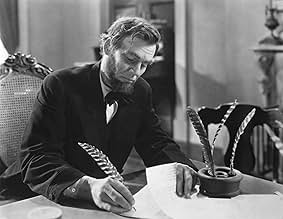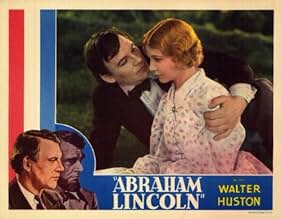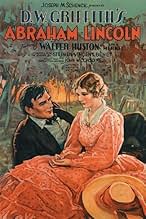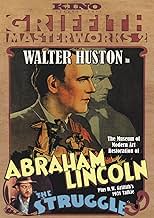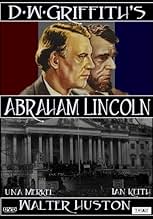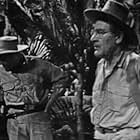IMDb RATING
5.6/10
1.8K
YOUR RATING
An episodic biography of the 16th President of the United States.An episodic biography of the 16th President of the United States.An episodic biography of the 16th President of the United States.
William L. Thorne
- Tom Lincoln
- (as W.L. Thorne)
Edgar Dearing
- Armstrong
- (as Edgar Deering)
Jason Robards Sr.
- Herndon
- (as Jason Robards)
Cameron Prud'Homme
- John Hay - Secretary to the President
- (as Cameron Prudhomme)
James Eagles
- Young Soldier
- (as Jimmie Eagle)
Storyline
Did you know
- TriviaThis was D.W. Griffith's first sound film. Abraham Lincoln (1930) was also the first sound film about the Civil War which veterans of that war could view.
- GoofsIn both the Union and Confederate parades, the musicians play trombones with forward facing bells. During the Civil War, the bells faced backwards.
- Quotes
[death scene]
Ann Rutledge: I know the truth, dear. It's goodbye.
Abraham Lincoln: No, no, Ann, dear. You're not going to leave me. I won't let you!
Ann Rutledge: We must be brave, dear...
[looking up to the heavens]
Ann Rutledge: Don't take me away. Don't take me away! It's so dark and lonesome!
Abraham Lincoln: Ann, you mustn't let go.
Ann Rutledge: If they'd sing, I wouldn't be so afraid.
[a chorus of "Sweet By and By" swells up in the background]
Ann Rutledge: We will meet there, dear.
- Alternate versionsOriginally, this film was color-tinted in sepia-tone, with blue for night scenes. These prints also had a prologue. Current public-domain prints are in black and white, minus the prologue with a shorter running time.
- ConnectionsEdited into General Spanky (1936)
- SoundtracksBattle Hymn of the Republic
(ca 1856) (uncredited)
Music by William Steffe
Lyrics by Julia Ward Howe (1862)
Played during the opening credits and often in the score
Sung by an offscreen chorus during a civil war scene
Featured review
... "personally directed" by D. W. Griffith. Walter Huston stars as Lincoln, shown from his birth through his rough-and-tumble early years, his doomed romance with Ann Rutledge (Una Merkel), his marriage to the eccentric Mary Todd (Kay Hammond), and his election to the presidency, where he presided over the U. S. Civil War, during which he wrote the Emancipation Proclamation freeing the slaves, before being felled by an assassin's bullet.
Like most of Griffith's movies, this is a mixed bag of interesting choices, corny populism, and a rose-colored vision of the past. I was surprised by the opening of the film, set aboard a trans-Atlantic slave ship, featuring slave traders coldly discussing their remaining "inventory" as they toss a dead African overboard. As this was one of a few scenes missing its audio, I have a feeling it was often cut out during exhibition.
I was confused by Griffith's decision to cast E. Alyn Warren as both Stephen Douglas and Ulysses Grant: were there not enough qualified actors around? I liked seeing silent film stalwarts Hobart Bosworth and Henry B. Walthall as General Robert E. Lee and his attendant colonel, respectively. I liked Walter Huston as Honest Abe, and was surprised by how much he looked like the photographs of Lincoln in the last third of the film.
The biopic elements themselves are simplistic and hagiographic, and things seemed rushed, trying to tell his entire life story in 90 minutes. I was not a fan of Hammond as Mary Todd, and felt she dragged the proceedings down quite a bit.
Like most of Griffith's movies, this is a mixed bag of interesting choices, corny populism, and a rose-colored vision of the past. I was surprised by the opening of the film, set aboard a trans-Atlantic slave ship, featuring slave traders coldly discussing their remaining "inventory" as they toss a dead African overboard. As this was one of a few scenes missing its audio, I have a feeling it was often cut out during exhibition.
I was confused by Griffith's decision to cast E. Alyn Warren as both Stephen Douglas and Ulysses Grant: were there not enough qualified actors around? I liked seeing silent film stalwarts Hobart Bosworth and Henry B. Walthall as General Robert E. Lee and his attendant colonel, respectively. I liked Walter Huston as Honest Abe, and was surprised by how much he looked like the photographs of Lincoln in the last third of the film.
The biopic elements themselves are simplistic and hagiographic, and things seemed rushed, trying to tell his entire life story in 90 minutes. I was not a fan of Hammond as Mary Todd, and felt she dragged the proceedings down quite a bit.
- How long is Abraham Lincoln?Powered by Alexa
Details
- Release date
- Country of origin
- Language
- Also known as
- D.W. Griffith's Abraham Lincoln
- Production companies
- See more company credits at IMDbPro
- Runtime1 hour 36 minutes
- Color
- Aspect ratio
- 1.20 : 1
Contribute to this page
Suggest an edit or add missing content



